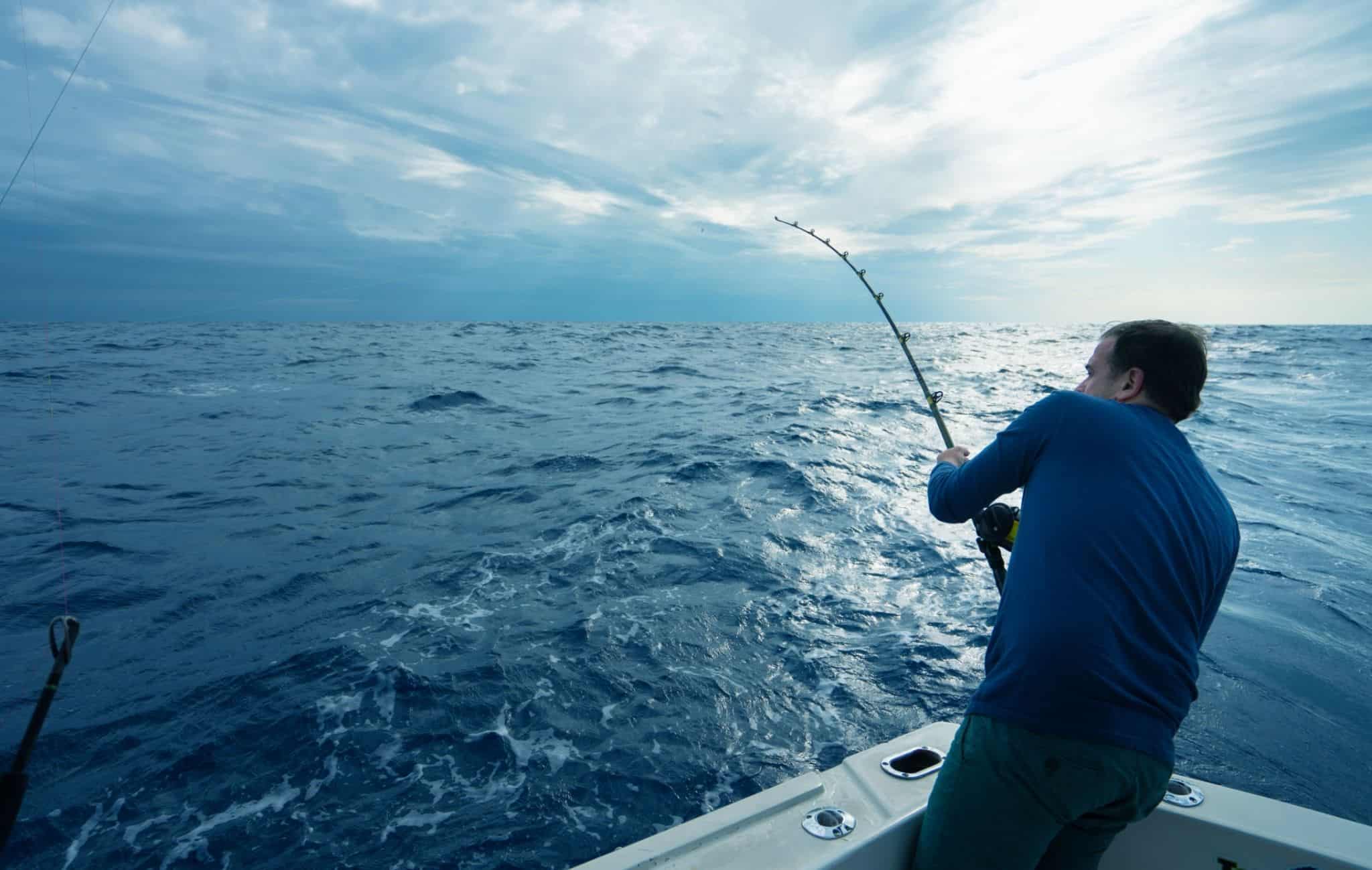If you love fishing, then you must already have deep sea fishing on your bucket list. After all, you’re in the middle of the ocean, waves moving your boat, and you’re waiting for that big catch of the day. Then suddenly, a 500-pound monster appears!
But you also might be wondering, is deep sea fishing dangerous? No, it (usually) isn’t! Let’s delve into the common concerns and risks and how to stay safe.

Is Deep Sea Fishing Dangerous?
Deep sea fishing isn’t as dangerous as one would expect, though it isn’t the safest activity. There are safety risks involved, admittedly. However, by knowing more about sea fishing, along with the preventative and safety measures, you can enjoy the trip without much worry.
It all boils down to preparation.
That said, if you are scared of the water’s uncertainty or need control over everything during the fishing trip, then this may not be for you. Remember, the waters are unpredictable and there will always be certain levels of risks.
But the risk is not the same as danger. As long as one is fully informed and aware of the risks deep sea fishing has, you can prepare and train yourself to face such risks, and even prevent them from happening. By doing this, deep sea fishing won’t be as dangerous as other types of fishing trips you’ve already done.
Here are the things to expect as you go deep sea fishing:
- You’ll be traveling far from land, with the boat going a few miles from the shore to reach waters deep enough to go deep sea fishing. You’ll be surrounded by water and you won’t see any land or coast at all!
- There may be severe weather conditions, with some charters setting sail even during heavy wind and rain. Expect to get wet whether the weather report says so or not, and also expect to stay under the hot sun all day. If ever the weather gets bad, the waters may become choppy, with the boat rocking more than usual. This may cause sea sickness or even boat flooding or capsizing!
- Deep sea fishing boats are larger than the usual ones that set out nearshore. These boats are bigger and stronger, so they can handle the strong winds and choppy waters. Also, they’re big enough so you can reel in large fish.
- There will be tough fish you’ll face as you go deep sea fishing, so prepare your strength, and even ask for help from others around you! Some anglers may fall overboard if the fish overpowers them, which is why you need backup.
There may be fires from fuel in the boats if mishandled. Furthermore, since you are far from land, you won’t have access to immediate healthcare in case of accidents or sickness.
While all of these sound scary, there is good news. As long as you are prepared and conduct the necessary safety measures, you can counter these risks.
Make sure you follow the safety guidelines, listen to the captain, and stay aware of your surroundings. And of course, select a reputable deep sea fishing charter with a professional crew and strong equipment to handle all fishing and safety needs.
Here are a few helpful safety guidelines to follow:
- Make sure you check the weather reports over the next days and weeks leading to your trip. By knowing the weather pattern, you’ll know when you should go fishing and what days to avoid.
- Prepare all the safety gear, especially a life jacket. Also, be aware of what the safety equipment the boat has and how to use them in case of accidents.
- Prepare your first aid kit, extra sets of clothes for both hot and cold weather, a towel, waterproof bag, sunscreen, and food. You may want to take anti-nausea medication before the trip, too.
- Connect with all communication channels to the shore, along with rescue groups. Let your loved ones know where you are and what time you plan to be back onshore. Both parties should be aware of what time you leave, the places you’ll head to, and when you expect to arrive.
- In case of dangerous situations, such as storms, trust the crew members and captain. They are experienced and will let you know if there’s anything you can do to help, or what you must do for safety. Also, do stay calm the entire time, panicking will not do anyone good.
- Do NOT drink too much. Avoid heavy alcohol and do NOT do any form of drugs on the boat. Intoxication can lead to reckless acts, with some falling off the boat or doing something dangerous to them and the crew.
Unfortunately, there has been an average of 42 deep sea fishing-related deaths every year from 2000-2015. This is most likely due to inadequate safety measures and recklessness. Rarely do people die in the sea when following the proper safety guidelines, as one dumb mistake can cost a life.
Other causes are natural phenomena, like storms. As long as you don’t head out to the seas during the worst weather conditions, you are fine. Other times, though very rarely, other accidents happen such as explosions, collisions, and rolling waves.
These are big safety risks, but again rare, so the best you can do is to be knowledgeable about these risks, follow what you’re told by the crew, and focus on having fun on a good day.
Wrapping It Up
Understandably, deep sea fishing can seem dangerous. While it has its risks, it isn’t a death wish provided you comply with all safety and preventative measures. Never act recklessly on the boat and always call for help when needed.
I hope you learned a lot about deep sea fishing and the risks involved. Be sure to keep these in mind as you plan your deep sea fishing trip. Good luck and stay safe!